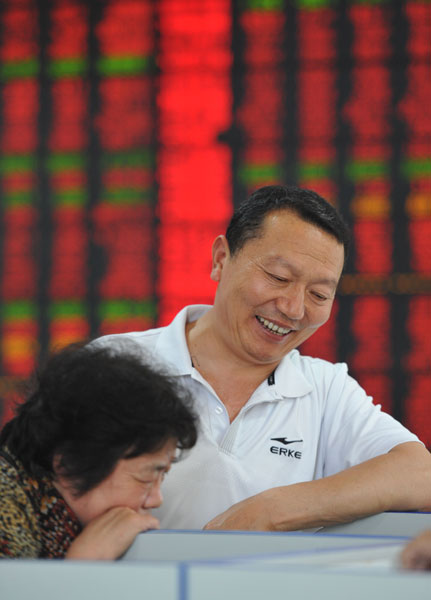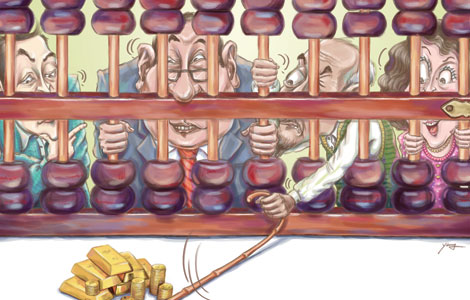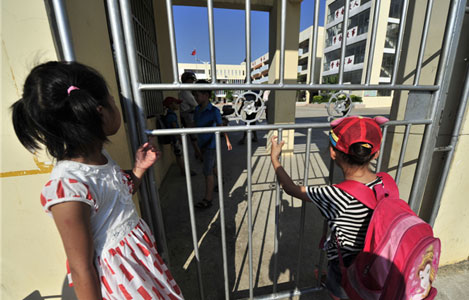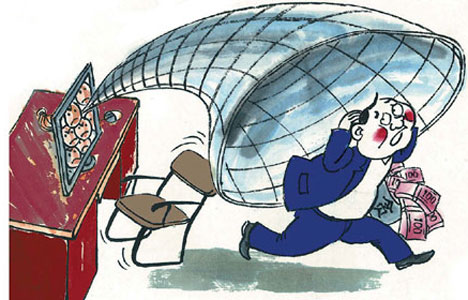Index edges to within touching distance of 2,300
Updated: 2013-05-21 07:06
By Xie Yu in Shanghai (China Daily)
|
|||||||||||
|
 Investors at a securities brokerage in Fuyang, Anhui province, on Monday. The Shanghai and Shenzhen bourses saw stocks from all major industry sectors rise, apart from pharmaceuticals and coal mining. [Photo/China Daily]
|
Mainland stocks rallied on Monday, with the benchmark Shanghai Composite Index rising by 0.75 percent to within touching distance of the psychological 2,300-point level, as investor confidence took heart from the latest economic reform measures.
The SCI ended at 2,299.99 as trading volume reached 128.84 billion yuan ($20.8 billion), a 16 percent rise on Friday.
All the main industry sectors saw growth, apart from pharmaceuticals and coal mining.
The State Council on Thursday published a list of items that no longer require central government approval, or have been delegated to lower-level authorities for clearance.
For instance, investment in large oil and gas fields, and airports no longer need to go through a long administrative approval process.
Analysts viewed the moves as positive steps toward the authorities lowering financial thresholds for investors, including foreign investors, which were likely to have a positive economic benefit.
"The speed of the authorities canceling administrative approvals is stunning," Xun Yugen, an analyst with Haitong Securities Co Ltd, wrote in a note on Monday.
"We can expect more reforms that could include further liberalization of bank interest rates and resource pricing."
She said moves on interest rates and exchange controls would help elevate share valuations in the long term, mostly benefiting blue chips, while reform of the system of computing the value of natural resources could trigger good opportunities for investment in the natural gas and railway transport industries.
The measures may include liberalizing interest rates and overhauling the fiscal system for local governments to ensure they have a steady stream of tax revenues, rather than having to rely on land sales for income.
"I think there is more room for growth, based on the relatively low valuation of shares," said Liu Yanfeng, a senior fund manager based in Beijing.
"The market has digested the effects of possible IPOs, and of course, simplifying the administrative management is positive."
The real estate sector edged ahead by 0.16 percent on Monday after Shanghai Securities Journal quoted investment banking sources as saying the authorities are considering loosening restrictions on refinancing for property developers, which some interpreted as a possible easing in the central government's ongoing policies aimed at curbing property prices.
The government has been issuing policies, including a property tax, to avoid a property price bubble.
But lower-than-expected economic growth in the first quarter has left officials with a dilemma: whether to continue to curb prices to avoid the bursting of a bubble; or allow the market to continue growing, which will boost the real estate market, and in turn help counter a slowdown in manufacturing and boost demand for steel, cement and electronic household goods.
"I am maintaining a bullish view on share prices in the property sector, in a middle and long term," added Liu, noting that he is also bullish on the technology, culture and media, and new energy sectors.
The National Bureau of Statistics has reported that new house prices in 70 major cities rose by an average of 4.3 percent year-on-year in April, up from 3.1 percent in March, while second-hand property prices rose by an average of 2.5 percent year-on-year, from 1.8 percent in March.
"They suggest that polices aimed at cooling the property market have not yet tightened sufficiently," Nomura Securities said in a report on Monday.
"We believe this will add further pressure on the government to tighten monetary policy in the months ahead, reinforcing our belief that total social financing peaked in the first quarter, and will decline in the second quarter.
"We maintain our view that economic growth will slow to 7.5 percent in the second quarter, largely due to this policy tightening."
Related Stories
China stock index futures open lower - May 16 2013-05-16 10:51
Index measuring use of yuan reaches new high 2013-05-07 20:58
Investors confident of stronger stock market performance 2013-05-08 05:50
Chinese investors confident in stock market 2013-02-02 15:58
China stocks rally on investor confidence -- June 13 2012-06-13 16:30
China calls for actions to maintain investors' confidence 2011-08-10 09:58
Today's Top News
China, India can build trust: Premier Li
First-tier cities barely livable, report says
Massive blast claims 13 in Shandong
Fight on drug smuggling for nation
China most financially secure country
Tajikistan president visits China
Voyage to Mars has its skeptics
Premier visits Gandhi's tomb
Hot Topics
Lunar probe , China growth forecasts, Emission rules get tougher, China seen through 'colored lens', International board,
Editor's Picks

|

|

|

|

|

|





